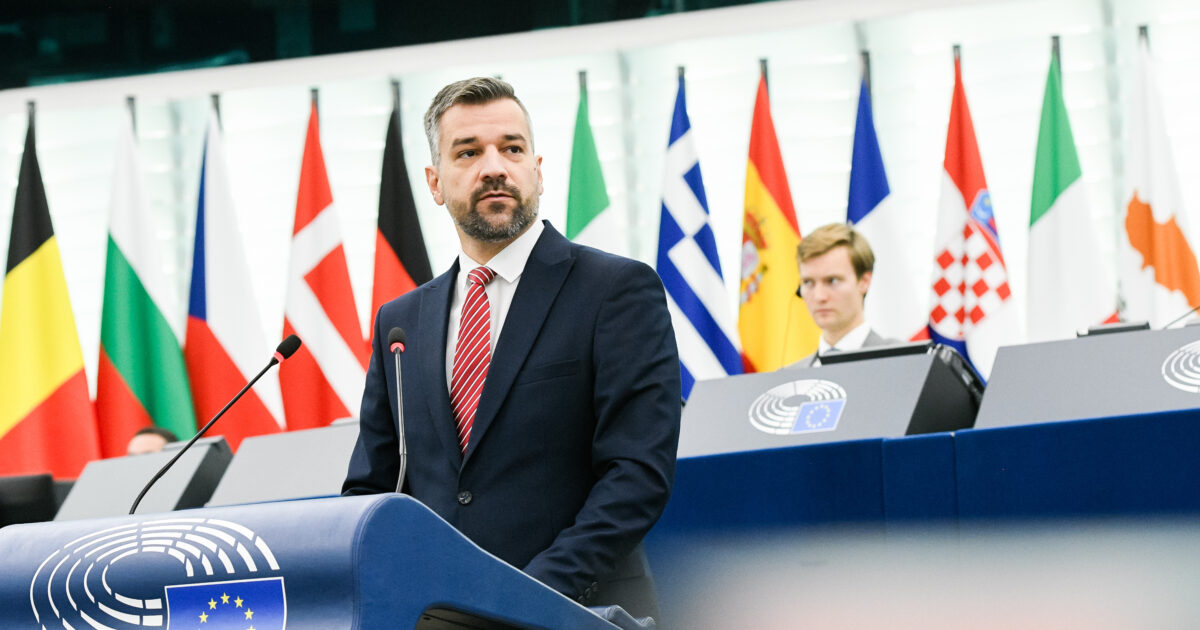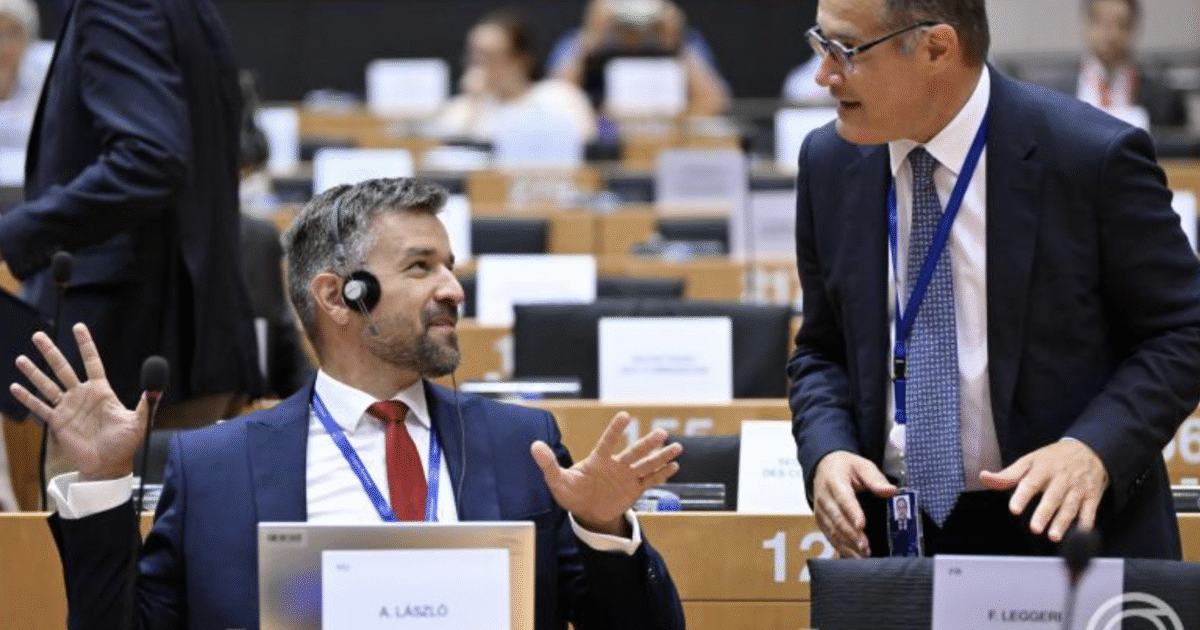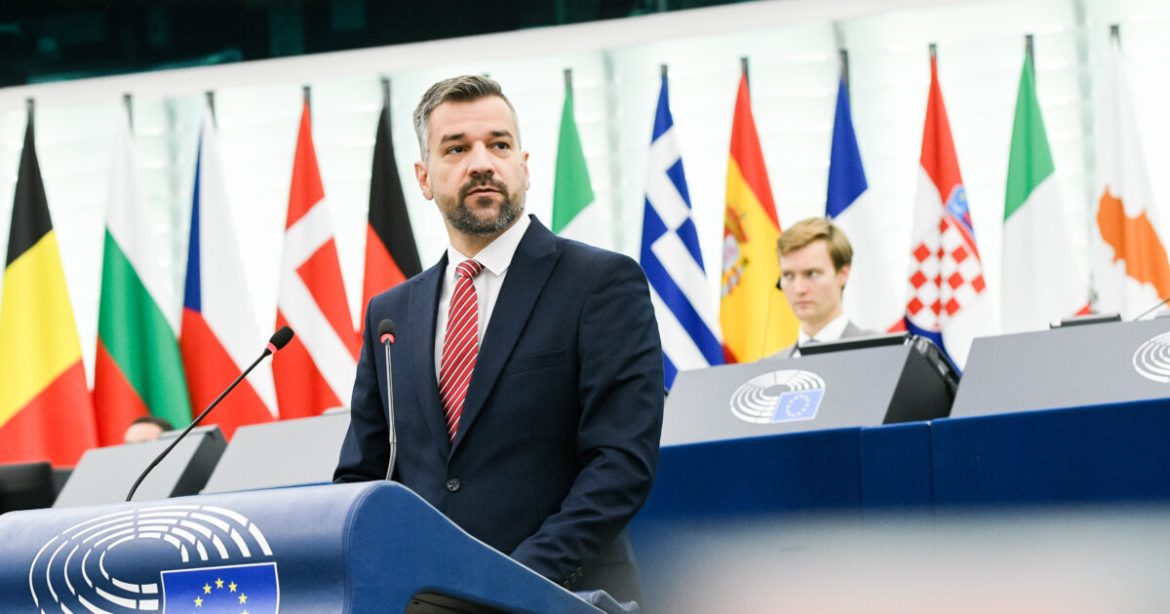

This interview was conducted by Alexander Junger and originally published by Eagle Eye Explore on May 23, 2025. It has been edited for clarity and readability, and is republished here at The Gateway Pundit with the kind permission of Eagle Eye Explore.
András László is a Hungarian politician and member of Prime Minister Viktor Orbán’s ruling Fidesz party. He was elected as a Member of the European Parliament (MEP) in 2024 and sits in the right-wing, sovereigntist Patriots for Europe Group.
As the country approaches a new election cycle, he discusses the opaque funding networks behind NGOs, ongoing investigations into U.S. and EU influence operations, Hungary’s outsized role on the international stage, and planned collaborations with figures such as Elon Musk and members of the Trump administration.
Congratulations on your recent appointment as a Government Commissioner tasked with looking into USAID’s political influence operations in Hungary. How are things progressing so far in your new role in the investigation into the USAID funds? Could you share more about your planned collaboration with figures like Elon Musk, the Trump administration, and others?
After Donald Trump took office, the U.S. suspended all USAID payments. USAID, the U.S. government’s international development agency, had long operated in cooperation with the State Department, the CIA, and the Department of Defense. Many agencies found it easier to outsource projects to USAID, but this was misleading.
When people think of development aid, they imagine humanitarian efforts—responding to natural disasters, preventing disease outbreaks, or rebuilding war-torn regions. But what the Trump administration discovered—and what many of us, including here in Hungary, had also observed—is that many of these so-called development projects were, in fact, vehicles for advancing left-wing political agendas abroad.
In Hungary, we’ve been actively resisting foreign political interference for years. We passed a law requiring organizations that receive more than 20% of their funding from abroad to disclose this on their websites. However, the EU forced us to repeal it. Despite this, we saw major foreign interference in our 2022 general elections—upwards of $10 million. Had the results gone the other way, we wouldn’t have the current government.
With elections approaching again next year, we are determined to prevent similar interference. We are committed to defending our sovereignty, our freedom, and our democratic institutions from outside meddling.
Interestingly, the U.S.—from the very system of interference once run by the Biden administration—is now signaling a shift as well. There are calls to refocus development policy on actual development, rather than partisan political causes or woke ideological projects. This change is welcome.
In response, the Hungarian government has appointed a Government Commissioner to investigate these matters—and I’ve been chosen for the role. I will work with U.S. counterparts to gather information on these projects and help ensure Hungary can take the necessary steps to protect its democratic integrity.
Are you able to share any information with the public about what your research—or your cooperation with Elon Musk—has uncovered regarding Hungarian NGOs, their activities, and the funding behind them?”
What has been revealed so far is that there was a clear intent to obscure the true source of funding for these projects. In most cases, it wasn’t USAID directly signing contracts with the grant recipients or project implementers in Hungary. Instead, the funding was funneled through multiple layers—two, three, sometimes even four tiers—of coordinating agencies, secondary programs, and sub-awards. This created a deliberately opaque system designed to conceal the origin and nature of the funding.
In many cases, a vague foreign organization would sign a contract with a coordinating body in Hungary, which then distributed the funds. While we often know the Hungarian organizations involved—both distributors and beneficiaries—what remains hidden are the intermediary layers. These coordinating agencies and mechanisms make the entire system highly opaque.
We don’t know who made the key decisions, why certain grants were awarded, how the funding amounts were determined, or what criteria were used to select recipients. Nor is it clear what the actual deliverables were—what results the projects achieved or how the recipient organizations accounted for the funds on behalf of those providing them. And of course, none of these so-called development grants were priorly discussed with the Hungarian government.
It’s as if the entire system was deliberately designed to obscure the origin of the funds.
Many of the organizations operating on the ground in Hungary are the same ones that receive funding from various EU and private entities, such as the Soros Foundation. These groups, often labeled as left-wing, media outlets, and NGOs, are heavily dependent on government funding—both from the U.S. and the EU. For years, they have received significant financial support to carry out projects, yet their activities often reflect a political bias. When you read Hungarian media or observe how these organizations act, especially in their opposition to conservative policies, it becomes clear that they are engaging in political interference that undermines Hungary’s democracy.

Since the cessation of USAID funding worldwide, have you noticed any changes in how these NGOs and media outlets operate? Have any of them been forced to shut down, or are they still sufficiently funded, continuing their activities despite the loss of US support?
Most of these organizations are still operating. The U.S. government and USAID have promised to halt projects focused on rule of law, democracy building, anti-corruption, and political activism, restricting development funding to actual development policy. While this is a positive step, it’s unclear how much money had already been funneled into the system before the funding freeze.
In the U.S., the left is strongly resisting this funding cut, using the courts to pressure the government to release the frozen funds. They’re also running stories about the supposed global consequences of the freeze, particularly in terms of children’s deaths, to create psychological and legal pressure on the administration.
As a member of the European Parliament, I see that EU institutions, particularly the European Commission and the majority of the Parliament, are keen to fill the funding gap left by USAID’s freeze. There is a clear political will among globalist, left-wing networks in Europe to ensure these organizations survive, possibly with fewer resources, but still operational.
As a Hungarian patriot, I value sovereignty and do not want any foreign interference in my country’s elections, whether through illegal campaign financing or otherwise. While I believe conservative parties should cooperate and share best practices, particularly in understanding how the left works together behind the scenes, I don’t think the right should mimic these networks. Instead, we should expose and fight against illegal and immoral foreign interference in our elections.
You recently called for the European Commission to publish all the contracts it has with NGOs. What do you reckon the contracts might look like?
Myself and other members of the European Parliament have demanded access to data on how EU taxpayer money is spent. There have been several scandals, including one earlier this year, where the European Commission paid green NGOs to lobby the European Parliament for even more extreme environmental policies. This has caused significant harm to European agriculture, energy sectors, industry, and households. It is both illegal and immoral for the executive branch to use taxpayer money to lobby the legislative branch.
Even the new European Commissioner has acknowledged that using EU funds for such purposes is highly inappropriate. Additionally, there are thousands of contracts we still don’t have access to, including the full COVID vaccine procurement contract. Despite calls from the EU ombudsman for the release of text messages from Commission President Ursula von der Leyen, the Commission continues to operate with little transparency regarding how it spends billions of euros of taxpayer money.
National transparency laws require that this information be made public or available upon request, but unfortunately, the European Commission consistently blocks our efforts to hold them accountable. Without access to how EU funds are spent, we cannot effectively oversee EU policies or ensure accountability.
Moreover, with the EU now stepping in to finance projects jeapordized by frozen USAID funding, it is essential to know who will be financed, through what mechanisms, and how taxpayer money will be spent.
Do you believe the levels of fraud, waste, and abuse are comparable to those seen in the United States?
When you have access to more power, you also bear greater responsibility to spend and use it wisely. This approach should apply at the EU level. While texts and regulations often promote transparency and accountability, the practice is lacking. We need the European Commission to release documents on how it spends money and formulates policies. Without this transparency, there are significant concerns about the misuse of these funds.
Your party colleague, Balázs Orbán, the political director of Hungarian Prime Minister Viktor Orbán, recently stated in an interview that the USAID scheme is the biggest corruption scandal in the world. That’s quite a bold assessment. I’m curious to know your take.
The statement by U.S. Secretary of State Marc Rubio speaks for itself. When an agency with tens of billions of dollars in funding announces it will terminate 83% of its projects, it’s clear there’s a problem. If 83% of its activities aren’t actually related to development work, it strongly suggests political corruption and misuse of taxpayer money. Every American citizen deserves to know how their money was used. There have been numerous contracts published, and in other countries, such as Hungary, citizens have a vested interest in understanding who benefited from this political interference in our democracy.

The European Union has taken a troubling turn toward anti-democratic authoritarianism. As you are well aware, last fall, following Călin Georgescu’s unexpected victory in the first round of Romania’s presidential election, the Constitutional Court annulled the results, and the election committee subsequently banned Georgescu from running in the rerun of the election. Later, Marine Le Pen was barred from running in France’s 2027 presidential election after being convicted of misusing EU funds. I’m eager to hear your thoughts on these events.
Lawfare is often used against politicians with a sovereignist, patriotic mindset, and we’ve seen this play out in various cases. For example, in France, it happened during the presidential race against François Fillon, and now we see it against Marine Le Pen, the leading candidate for France’s 2027 presidential election. This trend is deeply worrying. We also saw legal action against Matteo Salvini in Italy for his efforts to block NGO ships—whom I refer to as “fake NGOs” or migrant taxis—from bringing illegal migrants into the country. Now, there’s a court case against Andrej Babiš in the Czech Republic. Across Europe, lawfare is increasingly used to target conservative, patriotic politicians, and it’s heading in a dangerous direction for democracy and freedom.
Even when there’s misuse of funds or political interference, if the data is public and evidence is clear, voters should still have the freedom to decide who best represents their interests. In the end, elections should reflect the people’s choice on who is most capable of addressing the issues facing the country. Unfortunately, in Hungary, we had a socialist politician, who was convicted of election corruption. Despite this, in this heavily left-leaning district, his party nominated him again and voters chose to re-elect him. That’s just how things go sometimes.
Across Europe, lawfare is primarily used against conservative, patriotic politicians, often in cases where the left knows they are unlikely to win, but the goal is to smear the opposition. We’ve also seen similar tactics in the U.S., with legal and financial pressure aimed at undermining Donald Trump. Fortunately, American citizens saw through these tactics and still elected him president.
What’s particularly worrying is the reaction of EU institutions and senior EU politicians, especially regarding the Georgescu case. Thierry Breton, a former Commissioner, reportedly said, “We made it happen,” or something to that effect. Meanwhile, Europe’s top human rights court appeared not to take the case seriously. I have a suspicion that if Viktor Orbán were to charge Péter Magyar, the leading opposition figure in Hungary, with something and ban him from the election, the European Union’s response would be very different.
Well, you know, it’s a case of “rules for thee, but not for me,” right? This is especially true when it comes to lawfare. However, I believe people will ultimately make the right choice.
The European Parliament is now defending Péter Magyar, despite charges involving phone theft at a night club and other issues, with the majority of the European Parliament supporting him. This shows that the EU is eager to defend candidates who align with its own goals. Similarly, just before the Italian elections, when it was clear that conservatives were likely to win, Ursula von der Leyen warned that the EU knew what measures to take if the wrong policies were pursued. In Poland, after the liberal coalition won the elections, Ursula von der Leyen quickly unfroze funds that had been withheld due to “rule of law” concerns, even though the new government had not yet taken office and couldn’t amend any laws. This highlights the double standards and how lawfare is often used against conservative, patriotic parties.
It’s fair to say that Hungary has punched well above its weight over the past decade, particularly in terms of its political and cultural influence within the European Union and beyond. As a nation of fewer than 10 million people, where do you think Hungary derives the will, strength, and confidence to assert itself on the European and global stage?
Hungary enjoys massive domestic electoral support and a very stable parliamentary majority, which allows us to implement policies that prioritize the interests of our citizens without needing to justify ourselves to international liberal critics. Despite media attacks and pressure from the EU and the US, Hungarian voters have seen through these efforts and appreciated that we put their interests first.
In contrast, many European governments must explain to their citizens why they fail to address key issues, often justifying policies that go against voters’ preferences with weak moral or legal rationales. In Hungary, we can deliver because of our stable majority and strong coalition, and our voters appreciate that.
Hungary punches above its weight in international politics because our government is popular, conservative, and unafraid to uphold core values. This poses a threat to the globalist, liberal, and socialist left in Europe and the United States. While Hungary may be small, we show that it’s possible to succeed economically, socially, and politically by sticking to conservative principles—a rare example in the West today.
Fortunately, we’ve won all national and European elections since 2010 and we aim to maintain this momentum in the 2026 national elections.
The post Globalist NGOs Are Purposefully Hiding the Money Trail — Interview with Hungarian MEP András László appeared first on The Gateway Pundit.

